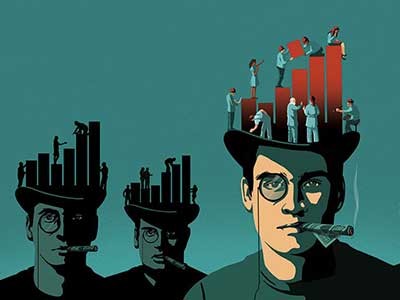
Illustration by Antoine Dore
In Defense of Open Society George Soros PublicAffairs (2019)
Capitalism, Alone: The Future of the System That Rules the World Branko Milanovic Belknap (2019)
Measuring What Counts: The Global Movement for Well-Being Joseph E. Stiglitz, Jean-Paul Fitoussi and Martine Durand The New Press (2019)
“In abnormal times the normal rules don’t apply and people obey them at their peril.” So writes ur-capitalist and philanthropist George Soros about the current “revolutionary moment” in In Defense of Open Society, his collection of essays diagnosing the sorry state of capitalism. Two other books with very different perspectives reach the same conclusion: that in the present tumult, the prevailing mode of economic organization is unsustainable.
In Capitalism, Alone, economist Branko Milanovic takes a less apocalyptic tone. Yet he shears away the woolliness of twentieth-century welfare capitalism. He reveals a future shaped by a clash of capitalisms — hyper-commoditized US versus hyper-politicized Chinese — and by polarization between elites and the rest. Meanwhile, in Measuring What Counts, Nobel laureate Joseph Stiglitz, with fellow economists Jean-Paul Fitoussi and Martine Durand, avoid big-picture pronouncements, focusing on the need for different metrics. But they respond to the same tensions, writing that we can no longer ignore “that so little of the fruits of growth over the past decades have gone to the bottom 90%”.
Given ongoing global disruption — from ‘populist’ governments to a burning Amazon rainforest — each book engages with politics as well as policies. Never a wholly technical subject, economics is returning to its roots as political economy. So, although none of the books proposes new solutions, each reflects that realignment. They could also be seen as a response to growing concerns about the health of capitalism after decades of short‑term focus on financial gain alone.
Better metrics
Stiglitz and co-authors strongly advocate the use of economic indicators that dethrone gross domestic product (GDP, based broadly on the market value of all economic transactions). Measuring What Counts follows a 2009 report commissioned by the French government, translating its analysis into a policymakers’ manual for public consultation, and embedding “beyond GDP” metrics into budgets. The authors see statistics as central “to more democratic engagement” of societies, driving fundamental questions: “What do we value? What should we measure? What should we pay more attention to?”
As they remind us, anything unmeasured is invisible to policymakers. We are paying for the statistical invisibility of powerful trends, from human well-being to environmental degradation. Unequal incomes and health outcomes have not been measured regularly, so the declining life expectancy of US citizens without university degrees has become apparent only in the past few years. Many natural resources, worth some US$100 trillion to the global economy, have zero value in conventional statistical terms. No wonder they are wasted. All this is influenced by a 1997 paper by ecological economist Robert Costanza and others on ecosystem services and natural capital (R. Costanza et al. Nature 387, 253–260; 1997).
How to retool our concept of value
Stiglitz, Fitoussi and Durand urge policymakers to use a dashboard of metrics emphasizing environmental, political and social sustainability. These are linked: environmental pressures trigger conflict and migration, for instance. The desire for comprehensive statistics encompassing global linkages lay behind the establishment of the 17 goals, 169 targets and 232 indicators of the United Nations Sustainable Development Goals. But these, the book rightly observes, are “too many to be meaningfully comprehended or to be a focus of policy”. By streamlining their dashboard, the authors make it more likely to be embedded in policy decisions.
Alternative metrics are a vigorous area of research, as attested by the World Bank’s measurement of ‘comprehensive wealth’ and New Zealand’s 2019 ‘well-being budget’. But this is not to say that the economics and policy worlds have, with the force of revelation, decided to ditch GDP. Many argue for improvement, not overthrow. One of the UN’s periodic revisions of the international System of National Accounts (SNA), which encompasses GDP, is just getting under way. Even so, today’s economic and political polarization, unavoidable evidence of environmental damage, and technological disruption of society have left the SNA fragile. It is more likely to be upended now than at any time since it was created in the late 1940s.
With a better framework, things could be different, says Soros in In Defense of Open Society. His speeches and articles, written after the global meltdown of 2007–08, point to the liberal capitalist ideal: an ‘Open Society’, the dynamic, universalist, free society propounded by philosopher Karl Popper.
Like Stiglitz, Soros investigates the factors that contribute to instability. One, he argues, is the failure of orthodox economic theory, particularly the idea that the economic system tends to equilibrium. His 1987 book The Alchemy of Finance set out his alternative view as a successful investor, describing feedback loops in financial markets. But, as he notes, the economics establishment largely dismissed that as “the conceit of a man who has been successful in business and therefore fancies himself as a philosopher”.
It is hardly controversial, however. Soros posits that economic and social systems shape the views of people who participate in them, which affects their actions, in turn altering the economy. Start-ups might observe investors backing rapid growth at the expense of immediate profits, in a ‘winner-takes-all’ model. So they all adopt the same business system. This ‘reflexivity’ is equivalent to US sociologist Robert K. Merton’s principle of self-fulfilling outcomes. When you add uncertainty about the future, and lessons about human decision-making that are emerging from behavioural economics, the need for a subtler intellectual framework for economics is clear. The discipline is already shifting this way, with growing interest in psychology and social dynamics.
Another culprit threatens liberal capitalism, Soros argues: the technology industry, and the US–China tech ‘arms race’. He criticizes China’s authoritarian use of surveillance technology. Its developing ‘social credit’ system, for instance, aggregates personal data to rank citizens’ trustworthiness, affecting their access to certain rights. Soros is equally scathing about for-profit surveillance by the US behemoths of Silicon Valley. He likens it to extraction of natural resources; it’s just that “social media companies exploit the social environment”. Artificial intelligence represents mortal threats to liberalism because it puts power in the hands of a few, he argues.
Liberal vs political
In his overview of the recent history of capitalism and globalization, Milanovic likewise views current political and economic fragility in terms of a confrontation between China and the United States. Capitalism, Alone frames this as a conflict between models of capitalism: “liberal meritocratic” on the US side, “political” on China’s. Milanovic defines US liberalism as providing formally unrestricted opportunities for economic advancement. But given US inequities and lack of social mobility, ‘meritocratic’ seems debatable. Political capitalism, meanwhile, emerges from former communist countries, where the state’s needs take priority. The rule of law does not bind state action, and a technocratic bureaucracy is closely involved in economic management.
Milanovic contrasts both models with social democratic capitalism, shaped by economist John Maynard Keynes among others, including politicians rebuilding national economies after the Second World War. He also sketches an alternative “people’s capitalism”, echoed in today’s European and US progressivism.
Milanovic was trained in the Marxist economics of the former Yugoslavia. This might explain why historical forces are so central to his analysis — and why he is not optimistic about the chances of alternative models. He lists policies that might favour progressivism, such as improving publicly funded education. In my view, these are wishful thinking without analysis of the political obstacles to sensible policies (sensible, at least, to those who prefer to avert revolution). Nor does the book explore other current varieties of capitalism, such as the more egalitarian, consensual systems of Scandinavia or Japan. It would have been salutary to know how these are responding to the forces of globalization, technological overreach, an ageing population and environmental stress.
These existential pressures explain why all three books conclude that ‘business as usual’ in thinking about how to run an economy cannot continue. It is right to measure what societies actually value, as Stiglitz and his co-authors (and I) argue. It is also right, as Soros asserts, that the intellectual framework of economics must adapt to a world ever more removed from a focus on individual choices. This trend is under way in economic research, but a radical rethink is unlikely there: the incentives of academia encourage conservatism and incremental progress.
Better metrics and theories will not be enough to create a sustainable economic and social model. Or, they could — but only if they convince policymakers and the public to act differently. The future of capitalism is out of the hands of those who spend their time thinking about it.



 How to retool our concept of value
How to retool our concept of value
 GDP in the dock
GDP in the dock
 The architecture of inequality
The architecture of inequality





